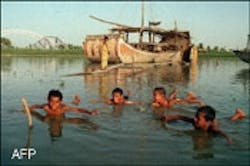India, Pakistan Hold Talks on Water-sharing Row
A ministry spokesman announced that India and Pakistan began another round of talks on resolving a water-sharing row triggered by New Delhi's decision to build a hydroelectric dam in divided Kashmir, according to a AFP report.
The dispute focuses on India's plans to construct the Baghliar Dam over the Chenab river in Indian-controlled Kashmir's Jammu region. The dam is being built in two 450-megawatt phases.
Pakistan says the dam in Chandrakot in southern Doda district violates the 1960 Indus Water Treaty on river water sharing, one of the nuclear rivals' most enduring agreements that has held through two wars between the countries, the report said.
Islamabad fears the dam could interfere with the flow of water from the Chemab river and deprive it of vital irrigation in Pakistan's wheat-growing Punjab province. In response, New Delhi says the fears are groundless.
The Federal Cabinet Minister, Sharif Naiz said, "We are not violating the Indus Water Treaty."
According to the AFP, the World Bank negotiated accord bars India from interfering with the flow of the three rivers feeding Pakistan – Indus, Chenab and Jhelum – but allows it to generate electricity from them.
The first phase of the Baghliar Dam was scheduled to be completed in 2004 but has been delayed by the dispute.
India and Pakistan are also trying to negotiate a solution to another dispute over construction of the Wullar Barrage on the river Jhelum, about 20 miles north of Indian Kashmir's summer capital, Srinagar, the report said.
India began constructing the barrage in 1985 but halted it two years later after Islamabad said the construction would affect the flow of Jhelum river water into Pakistan.
However, while the Wullar Barrage is part of an eight-point agenda chalked out by the rivals to resolve various disputes through a dialogue launched in January 2004, the Baghliar dam is not on the list.
Source: AFP
